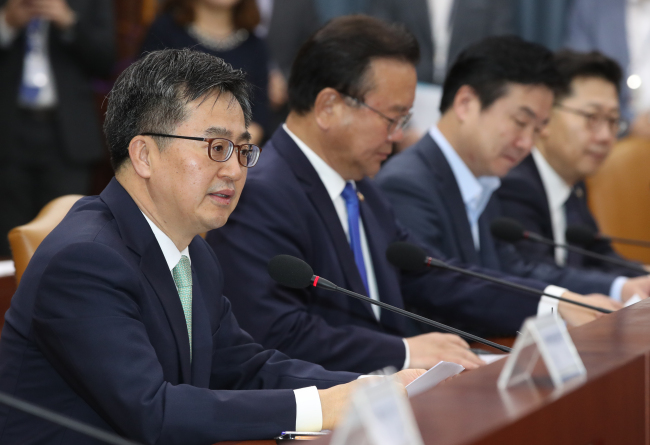Seoul will phase in FX market intervention disclosure plan: minister
By Bae Hyun-jungPublished : May 17, 2018 - 09:42
South Korea will be revealing its records on foreign exchange market intervention at an incremental pace, as part of efforts to promote the credibility of the nation’s currency policies, according to the top financial policymaker on Thursday.
“The disclosure of the (government’s) measures to stabilize the foreign exchange market is the right way to go,” said Deputy Prime Minister and Finance Minister Kim Dong-yeon in a meeting of economy-related ministers.
“But considering various circumstances and the nation’s economic maturity, we should be prudent in revealing the details.”
“The disclosure of the (government’s) measures to stabilize the foreign exchange market is the right way to go,” said Deputy Prime Minister and Finance Minister Kim Dong-yeon in a meeting of economy-related ministers.
“But considering various circumstances and the nation’s economic maturity, we should be prudent in revealing the details.”

Asia’s fourth-largest economy is currently the only country among member states of the Organization for Economic Cooperation and Development that does not disclose details of its foreign exchange market intervention.
Starting March, the government will be revealing the net amount of its market interference twice a year, a frequency which will be raised to once per quarter from 2020, officials said.
“I expect this measure to improve the transparency of the foreign exchange market and the nation’s credibility,” Kim said.
“We have no plans for further changes after (the quarterly disclosure takes effect),” he told reporters after the ministerial meeting, underlining that precautions have been taken to minimize the impact on the market.
After a meeting with officials from Standard & Poor’s later in the day, Kim said that the global ratings agency viewed the market interference disclosure plan as having little impact on Seoul’s foreign exchange market.
Since adopting the floating exchange rate system in 1997, the South Korean government has made it a rule that exchange rates are to be decided by the market.
“As the economic environment has changed over the years, the nondisclosure of the market stabilizing measures has triggered unnecessary misunderstandings or doubts on transparency,” Kim said.
“(Despite the disclosure plan), our principle remains that necessary market stabilizing measures will be taken in case of sudden volatility or one-side movements.”
Financial authorities have so far denied their alleged interference in the foreign exchange market, claiming that they only engaged in “smoothing operations” to deter extreme volatility.
In April this year, Washington kept Seoul on its monitoring list of currency manipulating states, a move which added pressure on financial authorities here to boost the transparency of the currency market.
Such pressure came in step with US President Donald Trump’s repeated vow to cut back on what he sees as unfair trade practices for the US economy.
By Bae Hyun-jung (tellme@heraldcorp.com)



















![[Today’s K-pop] BTS pop-up event to come to Seoul](http://res.heraldm.com/phpwas/restmb_idxmake.php?idx=642&simg=/content/image/2024/04/17/20240417050734_0.jpg&u=)